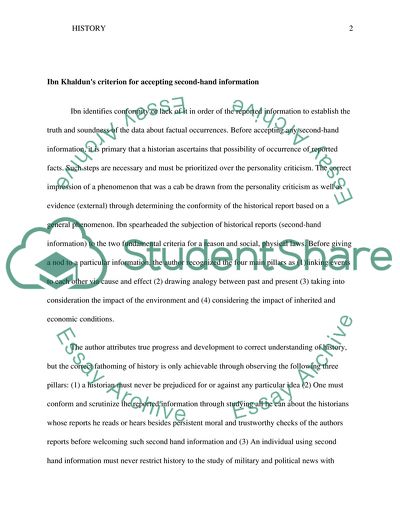Cite this document
(Ibn Khaldun's Criterion for Accepting Second-Hand Information Assignment Example | Topics and Well Written Essays - 1500 words, n.d.)
Ibn Khaldun's Criterion for Accepting Second-Hand Information Assignment Example | Topics and Well Written Essays - 1500 words. https://studentshare.org/history/1862326-explain-ibn-khalduns-criterion-for-accepting-second-hand-information-about-the-past-what-is-his-argument-why-is-this-important-to-understand-history-what-is-the-standard-he-uses-to-evaluate-historical-information
Ibn Khaldun's Criterion for Accepting Second-Hand Information Assignment Example | Topics and Well Written Essays - 1500 words. https://studentshare.org/history/1862326-explain-ibn-khalduns-criterion-for-accepting-second-hand-information-about-the-past-what-is-his-argument-why-is-this-important-to-understand-history-what-is-the-standard-he-uses-to-evaluate-historical-information
(Ibn Khaldun'S Criterion for Accepting Second-Hand Information Assignment Example | Topics and Well Written Essays - 1500 Words)
Ibn Khaldun'S Criterion for Accepting Second-Hand Information Assignment Example | Topics and Well Written Essays - 1500 Words. https://studentshare.org/history/1862326-explain-ibn-khalduns-criterion-for-accepting-second-hand-information-about-the-past-what-is-his-argument-why-is-this-important-to-understand-history-what-is-the-standard-he-uses-to-evaluate-historical-information.
Ibn Khaldun'S Criterion for Accepting Second-Hand Information Assignment Example | Topics and Well Written Essays - 1500 Words. https://studentshare.org/history/1862326-explain-ibn-khalduns-criterion-for-accepting-second-hand-information-about-the-past-what-is-his-argument-why-is-this-important-to-understand-history-what-is-the-standard-he-uses-to-evaluate-historical-information.
“Ibn Khaldun'S Criterion for Accepting Second-Hand Information Assignment Example | Topics and Well Written Essays - 1500 Words”. https://studentshare.org/history/1862326-explain-ibn-khalduns-criterion-for-accepting-second-hand-information-about-the-past-what-is-his-argument-why-is-this-important-to-understand-history-what-is-the-standard-he-uses-to-evaluate-historical-information.


